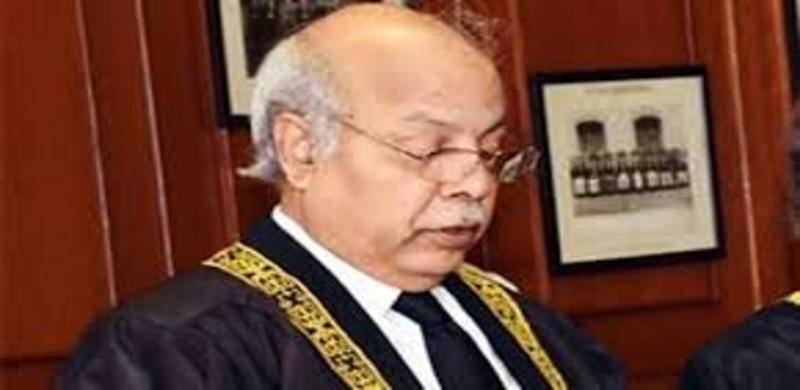
Supreme Court Chief Justice Asif Khosa is set to be replaced by Justice Gulzar Ahmed as the chief justice of Pakistan.
The Ministry of Law and Justice on Friday sent a summary to the Prime Minister’s Office for the appointment of Justice Gulzar Ahmed as the chief justice of the Supreme Court as the current chief justice would be retiring on December 20.
Justice Gulzar Ahmed was born in Karachi in the family of a notable lawyer, Noor Muhammad, in 1957. He completed his BA degree and LLB from Government National College, Karachi, and S.M.Law College, Karachi, respectively.
Justice Gulzar joined the Sindh High Court in 1986 and became an advocate of the Supreme Court in 1988. He became a judge of the Sindh High Court in 2002, while he was sworn in as a judge of the Supreme Court in 2011.
The judge was also elected as the honorary secretary of the Sindh High Court Bar Association for the year 1999-2000. He has also served as a legal adviser of various multinational and local companies.
Justice Gulzar has been a part of the benches in many high-profile cases. He was part of the bench which heard the famous Panama Papers case against former prime minister Nawaz Sharif and was one of the dissenting judges.
In his judgement, he had said that Nawaz Sharif had chosen to remain evasive and his attitude before the apex court was neither justified nor bona fide and was aimed at attempting to keep the court in dark. This, he added, casted doubts on the question of him being ‘sadiq’ and ‘ameen’.
Last year, Justice Gulzar Ahmed had heard the case of 10-year-old Amal, who was killed in a crossfire between police and robbers. The judge had termed Karachi Pakistan’s worst city in one of the hearings.
Justice Gulzar was also on the bench of the case pertaining to corruption in the Thar Coal project. In one of the hearings, he had criticised the Sindh government for not even completing one project with transparency.
In August, in a case pertaining to the deaths due to electrocution during the rains in Karachi, Justice Gulzar had termed Karachi’s authorities as complete failures when it came to fulfilling their responsibilities.
Last month, the judge had questioned the Federal Board of Revenue’s performance and had termed it a burden on the economy while criticising it for not meeting its tax targets even though it had employed more than 22,000 people.
The Ministry of Law and Justice on Friday sent a summary to the Prime Minister’s Office for the appointment of Justice Gulzar Ahmed as the chief justice of the Supreme Court as the current chief justice would be retiring on December 20.
Justice Gulzar Ahmed was born in Karachi in the family of a notable lawyer, Noor Muhammad, in 1957. He completed his BA degree and LLB from Government National College, Karachi, and S.M.Law College, Karachi, respectively.
Justice Gulzar joined the Sindh High Court in 1986 and became an advocate of the Supreme Court in 1988. He became a judge of the Sindh High Court in 2002, while he was sworn in as a judge of the Supreme Court in 2011.
The judge was also elected as the honorary secretary of the Sindh High Court Bar Association for the year 1999-2000. He has also served as a legal adviser of various multinational and local companies.
Justice Gulzar has been a part of the benches in many high-profile cases. He was part of the bench which heard the famous Panama Papers case against former prime minister Nawaz Sharif and was one of the dissenting judges.
In his judgement, he had said that Nawaz Sharif had chosen to remain evasive and his attitude before the apex court was neither justified nor bona fide and was aimed at attempting to keep the court in dark. This, he added, casted doubts on the question of him being ‘sadiq’ and ‘ameen’.
Last year, Justice Gulzar Ahmed had heard the case of 10-year-old Amal, who was killed in a crossfire between police and robbers. The judge had termed Karachi Pakistan’s worst city in one of the hearings.
Justice Gulzar was also on the bench of the case pertaining to corruption in the Thar Coal project. In one of the hearings, he had criticised the Sindh government for not even completing one project with transparency.
In August, in a case pertaining to the deaths due to electrocution during the rains in Karachi, Justice Gulzar had termed Karachi’s authorities as complete failures when it came to fulfilling their responsibilities.
Last month, the judge had questioned the Federal Board of Revenue’s performance and had termed it a burden on the economy while criticising it for not meeting its tax targets even though it had employed more than 22,000 people.
